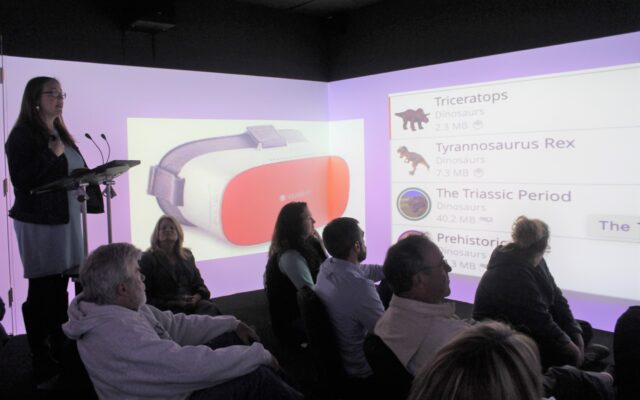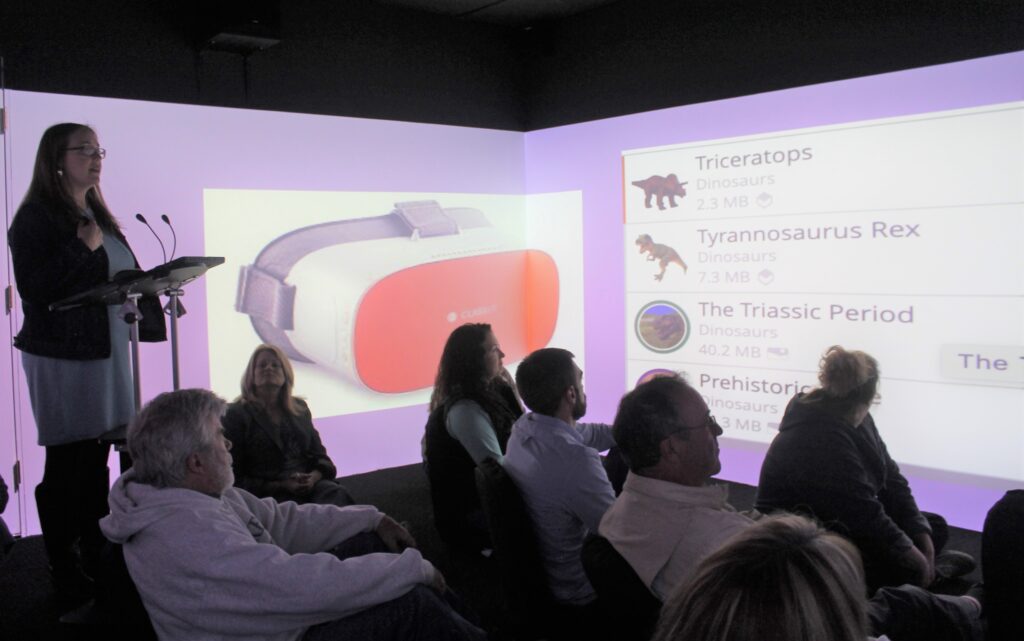
PCES launches virtual reality classroom
GUILFORD — Instead of watching their teacher write on the whiteboard while they take notes, elementary students at Piscataquis Community Elementary School can see their lessons through the only 360-degree virtual reality room in a public school in Maine.
The idea is that the four walls of the room of “the Pirate Portal” are actually screens, similar to an IMAX theater. Students sit in special chairs — which Principal Anita Wright compared to boat cushions with backs — on the floor that can be pivoted as the kids turn to watch the images unfold along the walls. Although usually the room would be rounded, the school district retrofitted a space it already had.
The technology is furnished by a company named Igloo that brings to life such experiences as going inside the human body or meeting a dinosaur face to face. Wright said she found it during the early days of the pandemic when she was researching how to help reengage students after they returned to the school building post-remote learning.
There are other virtual reality classrooms around the country, but they are not 360-degree systems. The PCES learning room is only the third Igloo Immersive Space to be located in a U.S. public school, along with one in Texas and another in Ohio that was finished just two weeks before the Guilford one.

VIRTUAL LEARNING — Teacher Heidi Hall demonstrates a grade 2 lesson on dinosaurs to the SAD 4 School Board in Piscataquis Community Elementary School’s new 360-degree virtual reality room — the “Pirate Portal” — during an Oct. 11 meeting.
The Pirate Portal is supplemented by two dozen VR headsets and eight 360 GoPros.
“This was a wonderful way to spend that COVID relief money because it absolutely addresses social emotional needs as virtual reality is becoming a leading therapy for anxiety and depression and because of the engagement of students the retention is quite significant in terms of learning,” Wright said.
The majority of the project was funded through an approximately $120,000 Elementary and Secondary School Emergency Relief grant made up of COVID-19 relief monies. The funds were earmarked for addressing social-emotional and learning issues for students coming out of the pandemic.
Teachers are already using it in their curriculums and the SAD 4 School Board experienced it at a meeting on Oct. 11, Wright said.
The Pirate Portal has been live for 10 days as of the meeting date, and teachers have already started using it in their curriculum. She said the space is not simply an enrichment opportunity but “a new way of teaching and learning.”
Wright said she looked into virtual reality and spoke with Thomas College Early Childhood Education Professor Dr. Pamela Thompson and about her research on using VRvirtual reality for STEM instruction.
“Beyond STEM activities, it was an amazing teaching tool,” Wright said, as the Pirate Portal can help students with long-term information retention, and self-confidence, and can be therapeutic.
Thompson has contracted with the district to allow her students to work with the elementary school staff to learn about teaching customized math lessons and other instruction in virtual reality.
Thomas students are doing some of the legwork to find materials requested by teachers, and the teachers will be sharing with the Thomas students how to use the materials. Wright said this can potentially lead to student teaching opportunities at PCES.
With the school board members sitting on the chairs in the Pirate Portal during the Oct. 11“ meeting, teacher Heidi Hall said grade 2 students have used the VR headsets to examine dinosaur species.
“It is like the dinosaur would show up in front of them and they can see what it looks like with size, shape, skin, color,” Hall said as she projected portions of the lesson on all the Pirate Portal walls.
Hall said students read the book “The Dinosaurs of Waterhouse Hawkins” by Barbara Kerley and used the knowledge built from VR to better understand the text.
“We took a familiar story like Snow White and gave them a task,” Hall said. To help students learn about asking and answering questions, they virtually went into the story setting to ask questions about what they read and saw and to then find the answers.
PCES wants to partner with businesses to show students sights and sounds they would not see otherwise, Wright said. Instead of just hearing facts about hydro dams, they can go inside the turbine when business partners use a 360 GoPro camera to show the inner workings.
“Kids could see how this learning plays out in the workplace and that they can kind of have those early connections to businesses and see what those job opportunities are,” Wright said.
“It has a lot of possibilities, we’re still learning every day,” she said.
The principal said the new technology is expensive “so I retrofitted a space that we had, it’s not round, it’s not an igloo, we used our own people here to create this space.”
Wright said to save money for the installation, district staff did what they could with guidance on retrofitting from Igloo. Technology Director Jenny Watson ordered the equipment, wired the room, set projects, and more. Maintenance Director Mike Dexter made sure the room was renovated to specifications.
Contractor Justin Ames did the sheetrocking and smoothed the walls to the top level finish for these to be a screen. Custodian Byron Kelley then painted the walls.
“The installer from the Igloo company said that it was ‘the best prepared room’ in which he had installed 360 servers and media players,” Wright said.
“We literally retrofitted a space we already had and we used our own people and they brought the software and the server,” she said.
“In order to make it not just a cool field trip experience but to teach with it, we ordered 24 headmounted VR devices that can be signed out for the classroom and we ordered eight 360 GoPros so that content could be created,” the principal said.
The school was awarded one of only two Avantis World grants in the U.S. The 3-year grant program will provide the school with 700 lessons that can be used with 360 GoPros, and content will also be created specially for PCES.
The school has agreed to take part in a study being done by Harvard University and National Geographic as the Cambridge, Massachusetts university is conducting action research on extended reality. The research team will be led by Eileen McGivney — a PhD candidate in human development, teaching and learning and an instructor, and researcher — and includes Dr. Erika Woolse, a developer from National Geographic Explorer.
Wright said staff met with McGivney in August and has another meeting planned with both she and Dr. Woolse.
The principal said PCES also wants to use the Pirate Portal to establish a relationship with a sister school in Wales. She said the United Kingdom institution is also located in a rural part of the country so there will be some similarities, aside from different accents on each side of the Atlantic.
A ribbon-cutting ceremony for the new teaching tool is planned for Friday, Nov. 4.